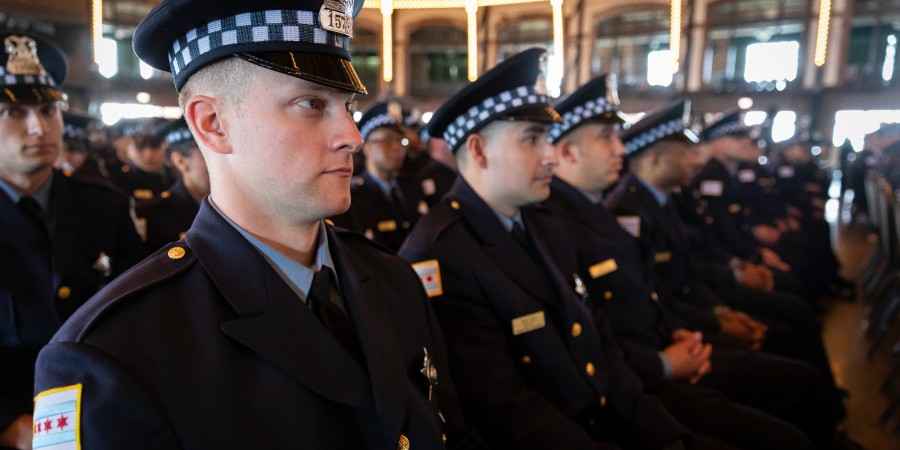A new University of Chicago academy seeks to build better police leaders
The well-funded initiative aims to reduce crime and reform departments by improving police supervision.
By Patrick Smith

A new University of Chicago academy seeks to build better police leaders
The well-funded initiative aims to reduce crime and reform departments by improving police supervision.
By Patrick SmithOver the past six years, as Chicago has struggled to reform its police department and keep down its gun violence, some experts have warned those efforts will fail unless the department improves the quantity and quality of its supervisors.
In between the superintendent at the top of the police department and the beat officers at the bottom are multiple levels of managers who are tasked with communicating strategy and policy changes to the rank-and-file cops, and then following up to make sure new policies are followed.
In an April interview with WBEZ about the department’s efforts to comply with the court-enforced police reform plan known as a consent decree, Chicago Police Department Executive Director of Reform Bob Boik said improving officer supervision “is a critical piece to really achieving the type of change that we’re seeking.”
“Historically, the profession of policing has relied upon the chain of command and the respect of the chain of command in order to supervise subordinates. But I think in a 21st Century policing environment, there has to be much more,” Boik said.
Now, a new academy from the University of Chicago Crime Lab will seek to train up those essential supervisors using data and behavioral science.
Chicago Mayor Lori Lightfoot said the training will help the city better support its officers as they seek to address “the twin challenges of community safety [and] police reform.”
“And that’s why I’m so pleased to … support this work, to support the training and leadership of police professionals, and they need it,” Lightfoot said. “And we have to do more to make sure that we have a career path for them, not just moving from patrolman to sergeant and up the ladder, but teaching real leadership skills, what it means not only how to take care of your members, and think about the soft skills and the HR needs, but also how you motivate folks to be in concert with the community to address and solve problems.”
The decision to launch the Community Safety Leadership Academies was inspired, according to Crime Lab officials, by research showing that police management and leadership practices can be at least as important to public safety as police funding levels. The research found that when police leadership changes, “it’s not uncommon to see reductions in violent crimes or police use of force on the order of 20-35%.”
“When we talk about policing in the United States and how to change it … we typically talk about things like ‘what is the right level of funding, or we talk about strategies that police departments should follow,” Crime Lab Director Jens Ludwig said. “But I think one of the things that’s brought us here today is the belief that there’s another explanation for variation across cities and police department effectiveness, which is the quality with which they’re managed and led.”
The training programs will last six months and the university is planning for its first cohort to graduate next year. The police leadership program will include supervisors from CPD and other departments from around the country, according to a University of Chicago spokesperson. The university is also launching a similar management training program for supervisors of community-based violence prevention workers.
Dr. Chico Tillmon, executive director of anti-violence organization READI Chicago, said as community-based work has become a more solid pillar of public safety it led to conversations about long-term needs for the organizations doing the work.
“We began to talk about collectively, what it would look like if we were to be able to professionalize this group of people, and make them a permanent part of this ecosystem, in the public safety plan,” Tillmon said.
The twin academies were announced at an event at the University of Chicago’s Hyde Park campus Tuesday morning, featuring many of the major players in Chicago’s battle against gun violence, as well as U.S. Deputy Attorney General Lisa Monaco.
The academies will largely be funded by Michael Sacks of Grosvenor Capital who is donating $2.5 million, and billionaire Ken Griffin, who is giving $25 million to the effort.
“Across private industry and the public sector, we know the immense power of data to drive effective decision making, along with the value of leaders who are dedicated to continuous improvement,” Griffin said at Tuesday’s event. “These same elements of effective management, learning and leadership have the power to transform policing. After decades of underinvestment in law enforcement human capital, it is time to bring the data driven management revolution to public safety.”
Griffin, who has expressed disgust and frustration with crime in Illinois and Chicago, has also put $45 million into backing GOP gubernatorial candidate Richard Irvin’s campaign. Crime, and how to prevent it, are shaping up to be among the largest issues in state races.
Patrick Smith is a reporter on WBEZ’s Criminal Justice Desk. Follow him @pksmid. Email him at psmith@wbez.org.